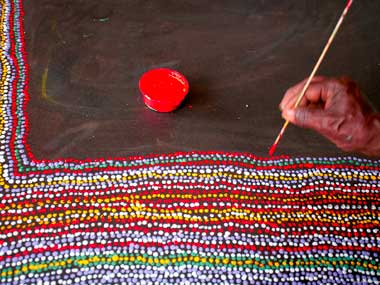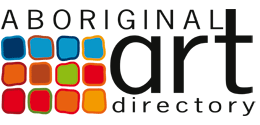Not Enough Actioned Since Aboriginal Art Senate Inquiry

Western Desert Mob Artist from Papulankutja Artists paints
Aboriginal Art Directory | 28.05.08
According to one of Australia’s leading Aboriginal art enterprise coalitions - Western Desert Mob, not enough has been actioned since the Senate Inquiry into Australia’s Indigenous visual arts and craft sector (report released June 2007). This inaction is compromising the survival of Aboriginal owned and governed Art Centres.
As debate continues concerning contentious issues such as ‘carpetbagging’ and the authenticity of Aboriginal artworks, Western Desert Mob
had hoped the Senate Report would finally be the catalyst for substantial and quick change in the Aboriginal Art industry.
Western Desert Mob spokesperson Mr Tim Acker says that while the Senate Inquiry laid some good foundations and increased funding for the future of the Aboriginal art industry, more action is needed.
“We need immediate action for Aboriginal owned Art Centre businesses to survive. Without some sort of protection - the future of Aboriginal art in Australia is bleak,” he stressed.
Mr Acker says while the Report was an exciting prospect for addressing unscrupulous behaviour in the industry, there has been too little action on the key recommendations.
“There is still considerable misleading information regarding what is authentic Aboriginal art, how art lovers can buy works of art with quality provenance and why this translates into a good investment,” he said.
The Report highlighted there would be extra funding for infrastructure, Art Centre management and the ACCC to enhance purchasing information for investors.
According to Western Desert Mob the investment will be positive in educating consumers to buy ethical and authentic art and the reasons why it is important.
“The extra funding for the ACCC towards educational programs for consumers to buy ethical and authentic art is an excellent step toward improving people’s understanding of the value of Art Centres and the power and investment value of buying strong provenance artwork – we just need it actioned,” Mr Acker said
Mr Acker added that the funding needs to work hand-in-hand with a strong code of conduct. “While there is only a voluntary code for the industry, we question whether this will be enough to eradicate unscrupulous dealers in the current market – and quickly.”
Mr Acker says unethical dealers continue to have a significant impact on the industry right now and without immediate action, members of groups such as Western Desert Mob face greater challenges to remain sustainable.
“Having witnessed at the coalface the distress to communities that unscrupulous commercial practice has caused, Western Desert Mob would like to see recognition and action immediately to ensure that Art Centres will be here tomorrow,” Mr Acker said.
Key to Art Centre’s survival is the education of art investors and the market in general in the value of purchasing authentic Aboriginal art from Aboriginal owned and governed Art Centres or recognised Galleries that purchase art through transparent and ethical processes.
“Contrary to common belief, buying authentic Aboriginal art has less to do with money and is more about the effect art and artwork has on the livelihood of communities.”
“Purchasing authentic art is more about the social function that the Aboriginal owned businesses contribute to the community in the form of jobs, creativity, health and well-being to name only a few of the flow-on effects,” he said.
“Buying Aboriginal Art Centre artworks supports the business model which focuses on maintaining Aboriginal owned and governed businesses – basically it supports the empowerment of Aboriginal people,” Mr Acker said.
“These businesses are proven to have a positive impact on the local community. Art Centres encourage intergenerational learning of stories and culture,” Mr Acker said.
The new breed of Art Centres, such as the members of Western Desert Mob provides artists a creative institution to develop artworks. It also provides dedicated support of art professionals to facilitate marketing and sales of their artwork while sustaining Australia’s unique cultural heritage.
“Art Centres support artists in equitably navigating the white-fella art market and to achieve the most beneficial outcomes for the artist, community and investor – there is no profiteering in the model,” he said.
Western Desert Mob offers consumers a clear pathway to purchasing an authentic Aboriginal artwork investment. (See attached fact sheet for more information.)
Western Desert Mob is an alliance of Aboriginal Art Centres, painters, woodcarvers and weavers from six remote WA communities.
The alliance was formed to ensure the wealth of talent and economic returns are retained in the local Aboriginal community.
Western Desert members:
- Warakurna Artists, Warakurna
- Papulankutja Artists, Papulankutja
- Kayili Artists, Patjarr
- Tjanpi Desert Weavers, NYP Lands
- Maruku Arts
- Tjarlirli Art, Tjukurla
Share this:
»  del.icio.us
»
del.icio.us
»  Digg it
»
Digg it
»  reddit
»
reddit
»  Google
»
Google
»  StumbleUpon
»
StumbleUpon
»  Technorati
»
Technorati
»  Facebook
Facebook
Contact Details
Gallery: Western Desert Mob
Further Research
Gallery: Western Desert Mob
News Tags: kayili artists | maruku arts | nyp lands | papulankutja | papulankutja artists | patjarr | tim acker | tjanpi desert weavers | tjarlirli art | tjukurla | warakurna | warakurna artists | western desert mob
News Categories: Media
News Archive
- 11.10.17 | RETURN OF MUNGO MAN
- 10.10.17 | TARNANTHI 2017
- 11.08.17 | Natsiaas 2017
- 08.08.17 | ABORIGINAL ART ECONOMICS
- 02.08.17 | SCHOLL'S NEXT MOVE
- 20.07.17 | APY ART DOMINATES THE WYNNE
- 17.07.17 | Anangu Artist Wins $100,000 Prize
- 14.07.17 | The End of AAMU
- 13.07.17 | YOU ARE HERE
- 11.07.17 | ART ACROSS THE COUNTRY
- 11.07.17 | TARNANTHI IN OCTOBER
- 05.07.17 | TJUNGUṈUTJA - from having come together
- 02.07.17 | BENNELONG
- 27.06.17 | JIMMY CHI
- 23.06.17 | Blak Markets at Barangaroo
Advertising

